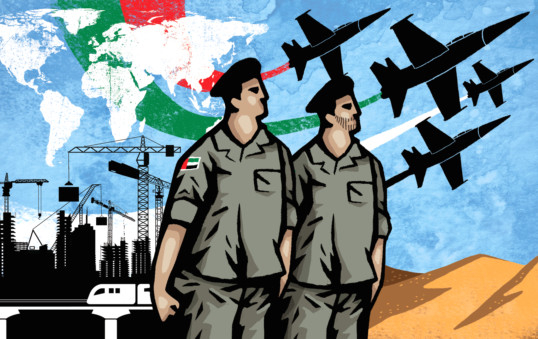
An important challenge that the UAE faces is how to ensure that its multiple messages to the outside world are heard consistently. The country is, at the same time, both, a significant contributor to the military coalitions against terror and chaos, and also an important global hub for travel and business. As it fights to defend stable and inclusive government in the Arab world, it is also seeking to diversify its economy into new strategic industries.
There is nothing inconsistent in these various positions. There is no internal clash in managing all these challenges. But outside the UAE, there is a need to make sure that all the messages are heard in the right places all the time, so the unique position of the UAE in the region is clear to anyone who wants to know.
The UAE has found its voice over the past two years, as it has started to vigorously and regularly articulate its active support for inclusive tolerance and stable and transparent governance as the core values by which it manages it own affairs and will help promote in others. This is important as it defines why the UAE has taken such a significant role in the fighting in Libya, Iraq, and Yemen. The risk and sacrifice is being undertaken for a clear purpose of supporting inclusive national governance against the chaos of terror, or sectarian or tribal xenophobia.
Fighting Daesh
For example, the UAE has taken a strong stand in spelling out the intellectual case against the terrorists of Daesh (the self-proclaimed Islamic State of Iraq and the Levant) and similar organisations. His Highness Shaikh Mohammad Bin Rashid Al Maktoum, Vice-President and Prime Minster of the UAE and Ruler of Dubai, summarised this last September when he wrote of the three components required to resit Daesh: Counter malignant ideas with enlightened thinking, open minds and tolerance; stable and transparent government institutions; and addressing the black holes of human development that breed despair.
This political position has led the UAE to commit its troops in Iraq and Jordan, from where its air force has been flying regular combat missions against Dash; and in Bahrain, where it has sent troops to back its fellow GCC member state against dangerous civil unrest; and more recently in support of the Saudi-led coalition to restore the legitimate government in Yemen.
This level of commitment gives the UAE serious credibility in the Gulf Cooperation Council (GCC) and Egyptian alliance that is starting to redefine the politics of the region, given the collapse of Iraq, Syria and Libya into civil war and chaos.
Economy
But all this activity does not negate in any way the UAE’s long-term plans for its economy and becoming a significant global hub and economic power house for the Gulf region and further afield Arab world. It has a young and ambitious population to whom to the government is committed to offer the best opportunities in the world,
The commitment to make Dubai’s Expo 2020 a success is a great example of how the UAE is nurturing its long-term economic ambitions. The six runways of Al Maktoum International Airport — with an initial capacity of 160 million passengers, going to 260 million later — the Metro and roads running to the airport are all necessary infrastructure for the Expo, but also for the UAE’s long-term future.
Another example is Abu Dhabi’s focus on using the huge Khalifa Industrial Zone in Kizad to diversify its economy into 12 strategic non-oil industries, including as disparate as building materials and metals engineering, iron and steel, plastic, aluminium, with a strong angle on looking to future needs with food industries, renewable energy and aviation also included. The plan is to develop important stakes in knowledge based industries that can both support the country’s economy and the UAE’s young people’s ambition for jobs that compete at a world level.
This dynamic economic policy is why the UAE gets regular visits from Asian and African leaders, who recognise that the UAE is part of their fast growing future that will dominate the global economy in the next century. The Gulf’s stake in that process, with the UAE leading the way, is very important for the long term prosperity and stability of the region. Multi-pronged
All this activity on many fronts means that it is a mistake to pigeon-hole the UAE into either the file concerned with the “fight against Daesh” or the “Asian economic boom”. The UAE cannot be seen through either one or the other lens and visitors to the country have to recognise that both files are very active and both are integral to the future of the country.
The UAE can only have a successful long-term economy with global partners in Asia and Africa, transparent and stable institutions and inclusive and open government. This is why it is fighting against Daesh in Iraq and is standing up for the legitimate government in Yemen, while also working with Egypt to provide a bulwark for national government as civil wars and warring sub-national groups based on tribes or sects have engulfed Iraq , Syria and Libya.
The threat of this kind of chaos has forced the UAE and its allies to act, in order to preserve a regional environment in which, their domestic and economic hopes can flourish.










